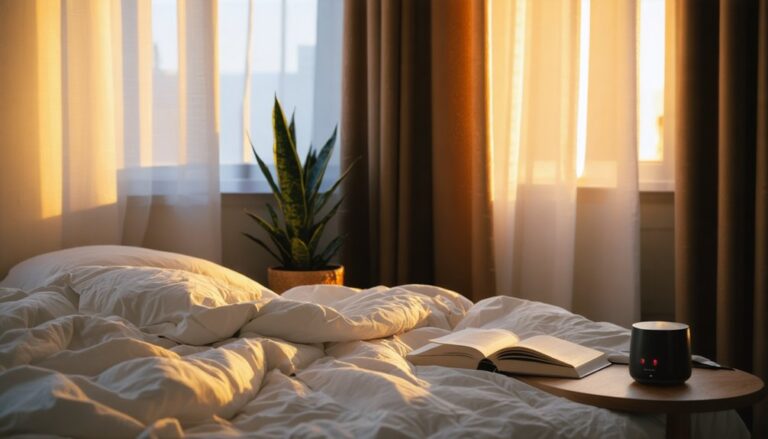Improving sleep quality can be achieved by implementing research-backed strategies. Establishing a consistent sleep schedule is a crucial step. Going to bed and waking up at the same time daily regulates the body’s internal clock, leading to better sleep quality. Additional strategies, such as adjusting the sleep environment and diet, can also significantly impact sleep optimization. By making these changes, individuals can experience improved overall health and well-being.
A well-regulated sleep schedule helps the body anticipate and prepare for sleep, making it easier to fall asleep and stay asleep. This, in turn, can lead to improved physical and mental health, including enhanced cognitive function, better mood regulation, and a stronger immune system. Scientific research supports the importance of a consistent sleep schedule, with studies showing that irregular sleep patterns can disrupt the body’s natural rhythms and lead to sleep disorders.
By incorporating sleep optimization strategies into daily routines, individuals can take control of their sleep and wake up feeling refreshed, revitalized, and ready to take on the day. As sleep expert Dr. Matthew Walker notes, “Sleep is not an optional lifestyle luxury, it’s a non-negotiable biological necessity.”
Highlights
Optimizing Sleep Quality with Proven Strategies
Establishing a consistent sleep-wake cycle is key to improving sleep quality, cognitive function, and overall well-being. Going to bed and waking up at the same time every day helps regulate the body’s internal clock and can have a significant impact on daily functioning.
Creating a sleep-conducive environment is also essential for relaxation and restful sleep. This involves controlling factors like light, noise, and temperature in the bedroom. By making a few simple adjustments, such as using blackout curtains, earplugs, or a white noise machine, individuals can create a space that promotes deep sleep.
In addition to a sleep-friendly environment, a relaxing bedtime routine can signal the brain to wind down and prepare for sleep. Activities like meditation, deep breathing exercises, or reading a book can help calm the mind and body, making it easier to fall asleep and stay asleep throughout the night.
Minimizing Screen Time Before Bed
Exposure to screens before bed can suppress melatonin production, making it harder to fall asleep. To combat this, individuals can use tools like blue light filtering apps or glasses, which can help minimize the negative effects of screen time on sleep quality. By limiting screen time before bed and using these tools, individuals can promote healthier sleep habits.
Dietary Strategies for Better Sleep
Nutrition also plays a critical role in sleep quality. Eating a balanced diet that includes essential nutrients like magnesium, vitamin B6, and tryptophan can help regulate sleep patterns. Additionally, avoiding heavy meals before bedtime and opting for herbal supplements like melatonin or valerian root can promote relaxation and improve sleep quality.
According to Dr. Nathaniel Kleitman, a sleep researcher, “Sleep is a fundamental aspect of human life, and optimizing sleep quality is essential for overall health and well-being.” By incorporating these proven strategies into daily routines, individuals can take the first step towards improving sleep quality and waking up feeling refreshed and rejuvenated.
Establish a Consistent Sleep Schedule
Establish a Consistent Sleep Schedule for Better Health
Maintaining a regular sleep-wake cycle is vital for improving sleep quality. Our internal clock, also known as circadian rhythms, responds to light and darkness to synchronize physiological processes, affecting sleep duration and quality. Irregular sleep schedules can lead to sleep disorders, impaired cognitive function, and a higher risk of chronic diseases.
On the other hand, sticking to a consistent sleep schedule can lead to better sleep quality, improved cognitive function, and overall physical and mental well-being. By setting a regular bedtime and wake-up time, individuals can establish a strong sleep-wake cycle that promotes healthy sleep duration and ideal physical and mental health.
For example, going to bed at 10 PM and waking up at 6 AM every day, including weekends, can help regulate the body’s internal clock and improve sleep quality. Research has shown that consistent sleep schedules can also boost the immune system, reduce inflammation, and lower the risk of chronic diseases such as diabetes and cardiovascular disease.
Why Consistency Matters
A consistent sleep schedule helps regulate the body’s internal clock, which responds to light and darkness to synchronize physiological processes. This internal clock influences sleep duration and quality, as well as other bodily functions such as hormone secretion, metabolism, and body temperature.
When we stick to a regular sleep schedule, our internal clock can function properly, leading to better sleep quality, improved cognitive function, and overall physical and mental well-being. As Dr. Matthew Walker, a sleep expert, notes, “Consistency is key when it comes to sleep. By establishing a regular sleep-wake cycle, we can improve the quality of our sleep, boost our immune system, and reduce the risk of chronic diseases.”
Create a Sleep-Conducive Environment
Creating a Sleep-Conducive Environment for Better Rest
Establishing a consistent sleep schedule is just the beginning. To improve sleep quality, it’s vital to create a sleep-conducive environment that promotes relaxation and restfulness. This can be achieved by incorporating several key elements into your bedroom setup.
Controlling Light and Noise
Light exposure is a significant factor in regulating melatonin production. Bright lights can suppress melatonin, making it harder to fall asleep. To mitigate this, use blackout curtains, blinds, or shades to control the amount of light entering your room.
Additionally, consider using light bulbs with a lower color temperature, such as warm white or soft white, which can help create a cozier atmosphere.
Noise reduction is also crucial for a restful night’s sleep. Loud sounds can disrupt sleep patterns and make it challenging to fall asleep or stay asleep. Use earplugs, earmuffs, or white noise machines to minimize external noise.
You can also consider using a fan or a sound machine with calming sounds, such as rain or ocean waves, to create a soothing atmosphere.
Regulating Temperature and Bedding
A cooler room temperature is ideal for sleep, with the National Sleep Foundation recommending a temperature range of 60-67°F (15-19°C). A temperature-controlled room can help promote better sleep quality and duration.
Consider using a programmable thermostat to regulate your room temperature.
Bedding comfort is also essential for a restful night’s sleep. Invest in a supportive mattress and comfortable pillows that promote relaxation.
Choose breathable, natural fabrics, such as cotton or bamboo, for your bedding and pajamas to help regulate body temperature.
The Power of Scent and Decluttering
Scent therapy can be a powerful tool in promoting relaxation and sleep. Certain scents, such as lavender and vanilla, have been shown to have a calming effect on the mind and body.
Use essential oils or scented candles to create a peaceful atmosphere in your bedroom.
Finally, decluttering your bedroom can help reduce stress and anxiety, creating a peaceful atmosphere that nurtures sleep.
Remove any unnecessary items, such as electronic devices or cluttered furniture, and create a relaxing space that promotes restfulness.
Quote: “A sleep-conducive environment is not just about creating a dark, quiet space. It’s about crafting a sanctuary that promotes relaxation, reduces stress, and fosters better sleep quality.”
Develop a Relaxing Bedtime Routine
Developing a Relaxing Bedtime Routine for Better Sleep
As the body prepares for sleep, a consistent pre-sleep routine can signal to the brain that it’s time to wind down. Research has shown that engaging in relaxing activities before bed can improve sleep quality.
Mindfulness meditation is one effective strategy to incorporate into your bedtime routine. Studies have found that mindfulness meditation can reduce symptoms of insomnia and promote relaxation.
In addition to mindfulness meditation, listening to soothing music can also help create a calming atmosphere. A study published in the Journal of Music Therapy found that listening to calming music before bed improved sleep quality in adults.
By incorporating these activities into a relaxing bedtime routine, individuals can prepare their minds and bodies for restful sleep.
A consistent pre-sleep routine can also help signal to the brain that it’s time to sleep. By establishing a calming and predictable bedtime routine, individuals can improve the quality of their sleep and wake up feeling refreshed and rejuvenated.
As Dr. Matthew Walker, a renowned sleep expert, notes, “Sleep is the single most effective thing we can do to reset our brain and body health each day.”
Limit Exposure to Screens Before Bed
Limiting Screen Time Before Bed for Better Sleep
Reducing exposure to screens and the blue light they emit is crucial for a good night’s sleep. Blue light can suppress the production of melatonin, the hormone that regulates sleep, making it harder to fall asleep. A study suggests that avoiding screens for at least 30 minutes before bedtime can improve sleep quality.
The American Academy of Sleep Medicine recommends this simple yet effective habit to promote a restful night’s sleep.
In addition to reducing screen time, using blue light filtering glasses, apps, or software can minimize the negative effects of screens on sleep. For individuals who must use screens before bed, these tools can help mitigate the impact of blue light on melatonin production.
By prioritizing screen-free time before bed, individuals can wake up feeling refreshed and prepared for the day ahead.
“By making a few simple changes to our bedtime routine, we can improve the quality of our sleep and wake up feeling refreshed and revitalized,” says a sleep expert.
By limiting screen time before bed and using blue light filtering tools, individuals can take control of their sleep and wake up feeling their best.
As a general rule, avoiding screens for at least 30 minutes before bedtime is recommended. However, using blue light filtering tools can help minimize the impact of screens on sleep.
Some popular blue light filtering apps include f.lux and Twilight. Blue light filtering glasses, such as those made by Gunnar Optiks, can also be an effective tool for reducing the impact of blue light on sleep.
Avoid Stimulating Activities Before Sleep
Establishing a Relaxing Pre-Sleep Routine
Engaging in stimulating activities before bed can hinder sleep quality and make it challenging to drift off. Research indicates that activities that stimulate the brain, such as watching exciting movies, participating in intense conversations, or playing competitive games, can disrupt the body’s natural sleep-wake cycle.
To signal to the brain that it’s time to sleep, individuals can try calming techniques like reading, meditation, or deep breathing exercises. By incorporating relaxing pre-sleep routines and avoiding stimulating activities, individuals can enhance their sleep quality and wake up feeling more refreshed and rejuvenated. This approach is particularly beneficial for those who struggle with falling asleep or experience frequent nighttime awakenings.
The Importance of a Consistent Sleep Schedule
A consistent sleep schedule is crucial for maintaining good sleep hygiene. Irregular sleep patterns can confuse the body’s internal clock, leading to difficulties falling asleep and staying asleep.
By establishing a regular sleep schedule, individuals can help regulate their body’s natural sleep-wake cycle, leading to improved sleep quality and overall well-being.
Creating a Sleep-Conducive Environment
A sleep-conducive environment is essential for promoting relaxation and improving sleep quality. This can be achieved by ensuring the bedroom is dark, quiet, and at a comfortable temperature.
Investing in a comfortable mattress and pillows can also help create a relaxing sleep environment. Additionally, avoiding screens and electronic devices before bedtime can help reduce distractions and promote a restful night’s sleep.
Quote: “A good night’s sleep is the best way to ensure a productive tomorrow.” By prioritizing sleep and establishing a relaxing pre-sleep routine, individuals can wake up feeling refreshed, revitalized, and ready to take on the day.
Optimize Your Diet for Better Sleep
Optimizing Your Diet for Better Sleep
Diet plays a crucial role in promoting better sleep quality. Nutrient timing is key, and research suggests that eating a light dinner and a balanced breakfast can improve sleep quality. This allows your body to establish a natural sleep-wake cycle.
Herbal supplements such as melatonin and valerian root have also been shown to promote relaxation and reduce the time it takes to fall asleep. Additionally, getting enough magnesium is essential for regulating the body’s internal clock and promoting relaxation.
Maintaining hydration balance is also important. Dehydration can disrupt sleep patterns, so drinking water throughout the day can help promote a restful night’s sleep. However, avoid excessive fluid intake before bedtime to avoid frequent trips to the bathroom during the night.
By incorporating these dietary strategies, individuals can optimize their sleep quality and improve overall well-being. According to experts, “A well-balanced diet is a critical component of maintaining good sleep hygiene, as it can help regulate sleep-wake cycles and promote relaxation.”
Nutrient-Rich Foods for Better Sleep
- Fatty fish (source of vitamin B6 and serotonin)
- Sweet potatoes (rich in potassium and magnesium)
- Bananas (potassium and melatonin)
- Turkey and chicken (tryptophan, an essential amino acid)
Supplements and Herbal Remedies
- Melatonin supplements: 1-2 grams, 30-60 minutes before bed
- Valerian root: 500-1000 mg, 30-60 minutes before bed
- Magnesium: 200-400 mg, 1-2 hours before bed
Hydration Balance
- Drinking at least 8 cups (64 ounces) of water per day
- Avoiding excessive fluid intake before bedtime
- Staying hydrated by eating water-rich foods, such as cucumber and watermelon
Conclusion
Scientifically-backed sleep optimization strategies provide a well-rounded approach to improving sleep quality. Establishing a consistent sleep schedule, creating a sleep-friendly environment, and developing a calming bedtime routine are essential for enhancing sleep hygiene. Limiting screen exposure and avoiding stimulating activities before sleep also promote restful sleep. Additionally, incorporating sleep-promoting nutrients into your diet can support overall sleep quality. Implementing these evidence-based strategies can improve sleep quality, leading to better overall health and well-being.
A consistent sleep schedule regulates the body’s internal clock, helping you fall asleep and stay asleep. A dark, quiet, and cool sleep environment also promotes relaxation, making it easier to fall asleep. A calming bedtime routine, such as reading a book or taking a warm bath, can signal to the body that it’s time to sleep.
Incorporating sleep-promoting nutrients like melatonin, valerian root, and magnesium into your diet can also support sleep quality. These nutrients help regulate the body’s sleep-wake cycle and promote relaxation. Limiting screen exposure before sleep is also crucial, as the blue light emitted by smartphones, tablets, and computers can suppress melatonin production.
By implementing these sleep optimization strategies, individuals can improve their sleep quality and overall health. As the National Sleep Foundation notes, “Sleep plays a critical role in overall health and well-being. Getting enough sleep is essential for physical health, including the healing and repair of heart and blood vessels.” Prioritizing sleep and making it a priority can have a significant impact on overall health and well-being.
Sleep Optimization Strategies:
- Establish a consistent sleep schedule
- Create a sleep-friendly environment
- Develop a calming bedtime routine
- Limit screen exposure before sleep
- Incorporate sleep-promoting nutrients into your diet
By incorporating these strategies into your daily routine, you can improve your sleep quality and wake up feeling rested, refreshed, and ready to take on the day.




